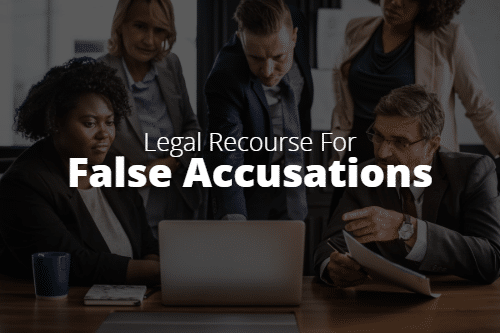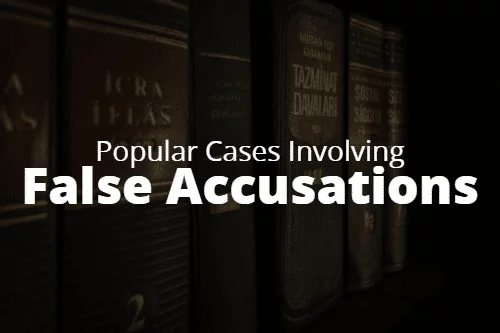
- Originally Published on June 4, 2019
Suing Someone For False Accusations: U.S. False Accusations Law Guide
What happens when someone falsely and wrongly accuses you of having committed an egregious crime? Or, what happens if someone mixes you up with another person and alleges you were in fact the perpetrator of an unspeakable act? Both sets of unfounded and baseless allegations stand to ruin not only your personal reputation, but your professional one as well. Don’t let someone else’s loose tongue or malicious agenda potentially ruin your life. So, what legal recourse is there for someone who has false allegations made against them? Are there any false accusations laws protecting innocent persons? In this comprehensive post, we’re going to walk you through:
- What false accusations are,
- Several claims you may bring against a party for wrongly accusing you of a crime,
- Some of the most common instances where false accusations manifest, and
- What to do if you are falsely accused.
Defamation Removal Tip: If you’ve found false accusations and content posted about you online, there’s several free and easy steps you can take to suppress its visibility in Internet search results. For example, starting a blog and frequently updating it is an effective way to show Google’s content crawling algorithm that it should be prioritizing constructive content with your name. Furthermore, unlocking your social media accounts and openly commenting on high-profile pages is an effective way to increase your visibility.
If you’ve been the victim of false accusations and other malicious and defamatory online attacks, reach out to the internet defamation attorneys of Minc Law today! At Minc Law, we know the ins and outs of U.S. defamation law, and have secured the removal of over 25,000 pieces of defamatory and false online content, and all for a flat reasonable fee. Furthermore, we’ve litigated in over 19 states and 3 countries, so rest assured, we know defamation. It’s time to put an end to baseless and false allegations today! To schedule your free, initial no-obligation consultation with an intake specialist, call us at (216) 373-7706 or fill out our contact form online.
Let us help. Contact us for a free consultation with an intake specialist to help you explore your removal options and craft an effective strategy.Are you the target of defamation?
What Are False Accusations?
First, let’s start with false accusations and their definition. What exactly does “accusation” mean in the context of this post? For starters, false accusations may also be referred to as false allegations or unfounded accusations, and typically occur in the following situations:
- In the ordinary course of everyday life,
- Judicially, &
- Quasi-judicially (think of an arbitrator or administrative agency with powers resembling that of a legal court).
Specifically, false accusations refer to an unsubstantiated claim. Meaning, the claim or statement lacks supporting evidence to determine its veracity (whether it’s true or false). False accusations may generally be divided into three core categories:
- Completely fabricated: allegations which are entirely false, as the events in question didn’t actually happen.
- Wrongly accused perpetrator: allegations which allude to an event that did in fact happen, but were committed or perpetrated by a different individual than the one accused.
- Mixed allegations: allegations which combine both actual events and facts with things that never occurred.
So, what are some of the reasons for persons making false accusations and allegations? False accusations can be the product of several things, such as a person intentionally lying in order to further their own agenda, or unintentionally lying due to a distorted memory or mental illness. It’s also not unheard of for persons to raise false accusations against another in cases of “suggestive questioning” or improper and coercive interviewing techniques by police.

Legal Recourse For False Accusations
Let’s say you have been accused and charged of a crime you didn’t commit or other false criminal accusations – What legal recourse is there for false accusations? Keep in mind that if you have been charged with a crime and it has yet to be resolved in the legal system, then you cannot yet file a civil suit for false accusations/allegations. It’s only after you have been cleared by court of law and exonerated, that you have the legal right to commence a civil suit for financial compensation. Below are the most common types of claims that may be filed in response to having false accusations made about you.
Defamation of Character
Simply put, defamation of character refers to a false statement communicated to a third-party, which ultimately causes damage or harm to a person’s reputation. Defamation of character can be broken down into two fundamental types, depending on the form in which the statement was conveyed; libel and slander.
- Libel: the written communication of a false assertion of fact, which subsequently causes harm to another person’s reputation.
- Slander: the oral communication of a false assertion of fact, which subsequently causes harm to another person’s reputation.
For example, if you were falsely accused of child abuse or rape, and ultimately were fired from your job or suffered a certain type of loss or standing in your community, then you may have a claim for defamation of character. To check out your state’s respective defamation laws and statutes of limitations, head on over to our Complete Guide to US Internet Defamation Law. A defamed party who has been the victim of a statement imputing a serious crime, or crime or moral turpitude, may not have to actually prove damages in their claim, as they will be presumed. Such legal principle is referred to as ‘defamation per se’, and arises in cases where a defendant has made such an inherently defamatory and inflammatory statement about someone (such as charging them with a serious crime or about their profession). So, keep in mind, if you have been falsely accused of rape, robbery, or another serious crime, you may have a case for defamation of character.
Malicious Prosecution
Secondly, if you’ve had a criminal or civil charge brought against you, and you suspect the other party was fully cognizant of the claim’s falsity, then you may have a claim for malicious prosecution. Specifically, malicious prosecution is an intentional tort, which requires:
- The intentional and malicious pursuing of a legal action,
- Without probable cause,
- Which is ultimately dismissed in favor of the victim.
16 U.S. states do however require an extra element to be proved in malicious prosecution cases. Such element is commonly referred to as ‘The English Rule,’ and requires a person prove they suffered injury and damage exceeding that of the “normal” consequences of being sued. Some examples include proving your business’s bottom line suffered, along with other tangible, measurable damages.
False Imprisonment
Finally, if you’ve been falsely imprisoned due to false accusations, then you may have a potential claim for ‘false imprisonment’. Note that false imprisonment does not require the actual physical restraint of a person, as long as the person in question is under the belief that they are not free to leave. To prove false imprisonment in the United States, plaintiffs must generally prove:
- There was a detention in a bounded area,
- Without consent, and
- Without a legal or lawful arrest.
Some common examples of false imprisonment include, a bank robber taking hostages at a bank and a restaurant owner detaining a diner for failure to pay.
Defamation Law Tip: In the wild word of defamation, there’s numerous defenses parties can rely on when confronted with a libel or slander claim. Some of the most common defenses to defamation claims include: (1) truth, (2) opinion, (3) privilege, (4) consent, & (5) innocent dissemination.

Popular Cases Involving False Accusations
Below are just two of the most popular instances where persons are falsely accused of having committed a crime or other inappropriate act.
Rape
The false accusation of rape is a person’s intentional statement or reporting of a rape when one has not actually happened. While it can be difficult to determine the veracity of all rape allegations, it’s estimated that anywhere from 2% to 10% of all rape accusations are false. Felony rape is generally punishable by multiple years in state prison, and requires persons to register as a sex offender (usually for the rest of their lives), so lodging an unfounded rape accusation stands to change an innocent party’s life completely. Such consequences of being falsely accused of rape include:
- Being unable to work certain jobs (education, government, healthcare),
- Being excluded from welfare programs,
- Losing one’s right to bear arms, and
- Disqualification and revocation of any professional licenses.
In August, 2018, a woman was sentenced to one year in jail for making false rape accusations against two college football players. Her charge? A misdemeanor charge of “falsely reporting an incident” and “interfering with police.” Such case proves you can go to jail for false accusations. However, the punishment appears relatively disproportionate for the potential harm and stigma caused.
Child Abuse
False accusations of child abuse impute that a person has committed child abuse or child sexual abuse, when in fact, there was no abuse committed by the person accused. Being falsely accused of child sexual abuse carries great potential for stigmatization and damage to one’s reputation, as denial of child abuse by the accused party, is not commonly accepted. False reports of child abuse and child sexual abuse are especially common in custody and divorce proceedings, and are typically made after being coercively questioned or interrogated by the persons who believe (or want to believe) the abuse has happened. Oftentimes, children are not the ones making false accusations themselves, with most of the false accusations and allegations actually being initiated by an adult on their behalf.
Defamation Law Fact: Generally speaking, slander claims are usually required to be brought before libel claims due to their potentially fleeting evidence. Make sure you familiarize yourself with your state’s respective defamation statute of limitations, otherwise you may be barred completely from bringing an action altogether. Furthermore, we strongly recommend you consult an experienced defamation attorney to help assist you in any filing and discovery requirements.
If you’ve been falsely accused of sexual harassment, domestic violence, rape, or other crimes, we strongly suggest you reach out to an experienced internet defamation attorney to assist you in understanding your rights and legal recourse. False accusations and online defamation are two highly nuanced areas of law, so it’s extremely important to consult an experienced professional.

What Should I Do if I’m Falsely Accused of a Crime?
While the last thing anyone wants to be subject to is false accusations and allegations, there are several important steps one can take to help remedy and prepare themselves for an upcoming legal battle.
- Retain an experienced attorney as soon as you can,
- Gather all physical evidence relating to the accusation or allegation, including videos, photos, clothing, etc…,
- Compile all relevant records and documents, such as financial or legal memos, or emails or letters,
- Start a checklist detailing all evidence at the crime scene (if any),
- Build a list of potential witnesses.
Above are just some steps you can take before contacting an attorney, doing so will put you in a better off position than before, and will enable your attorney to sort through the material with ease. Keep in mind that while you may think talking to the person who has hurled false and baseless accusations is a good way to possibly work things out, don’t do it. Approaching a person who has made serious (and false) accusations against you can sometimes complicate the matter even further, and it could even result in being charged with “intimidating a witness.” Furthermore, sometimes persons are falsely accused of a crime, but have not actually been charged. In such cases, we strongly recommend reaching out to an experienced internet defamation attorney to assist in explaining the law and your rights.
Libel Removal Tip: When confronting online defamation and false accusations online, it’s important to screenshot and document everything. We also strongly recommend having a family member or trusted friend take accompanying screenshots, to help refute any claims by the opposing side that you tampered with the evidence.

Work With the Defamation Lawyers of Minc Law to Refute False Accusations!
If you’ve been the victim of false accusations or other defamatory attacks, contact the internet defamation removal lawyers of Minc Law today! You may be asking yourself, “Can an Attorney in Another State Represent Me?” The attorneys of Minc Law have litigated in over 19 states and 3 countries, and are available to hear your case no matter your location. . Furthermore, we’ve secured the removal of over 25,000 pieces of defamatory and baseless online content, so know that when working with the nationally recognized lawyers of Minc Law, you’re in good hands. Here’s what you can expect when working with the defamation lawyers of Minc Law:
- Respect & Courtesy: At Minc Law, we understand how invasive and overwhelming online defamation can be, so take solace in knowing that we are always on your side. After all, your goals are our goals.
- Open Dialogue & Communication: Some lawyers go missing once the defamation removal process has started. Not us. Once we’ve started with the takedown process, we will make sure to constantly update you with important details of your case. We’re here to keep you informed.
- We Get Results: Websites and businesses respond to Minc Law internet defamation attorneys. And, we’ve worked tirelessly in our tenure with website administrators, content managers, and third-party arbitration firms to secure swift and permanent removals.
Reach out today to schedule your free, initial no-obligation consultation with an intake specialist by calling us at (216) 373-7706 or by scheduling a meeting online by filling out our online contact form.
At Minc Law, we’re here to fight for your reputation.
★★★★★
“The Minc firm handled my case very quickly, efficiently and thoroughly. I am very pleased with the level of professionalism and quality of work that they provided.”
Anonymous, October 7, 2019
Get Your Free Case Review
Fill out the form below, and our team will review your information to discuss the best options for your situation.
This page has been peer-reviewed, fact-checked, and edited by qualified attorneys to ensure substantive accuracy and coverage.

